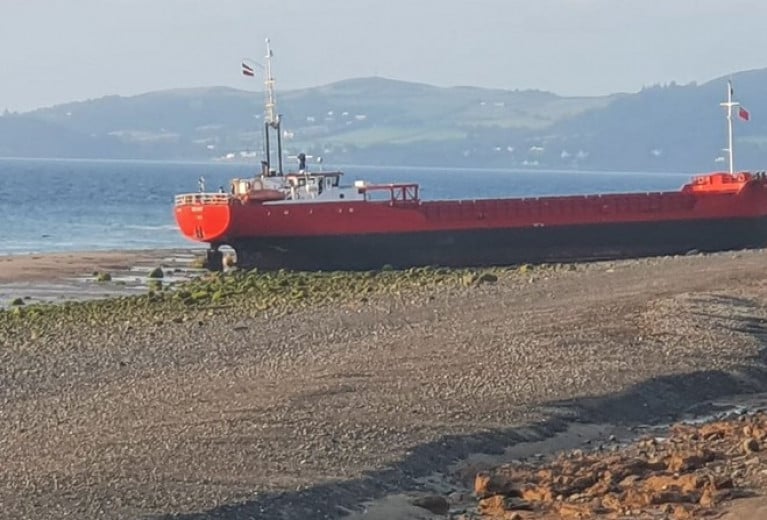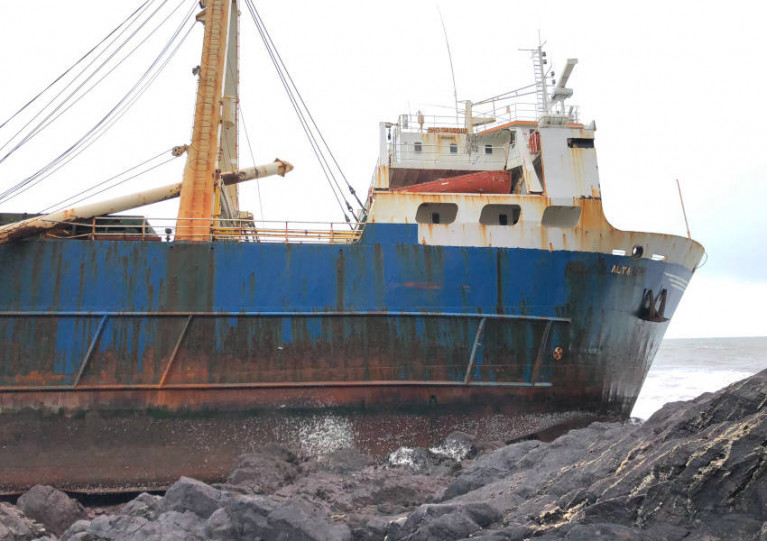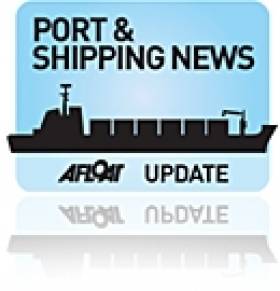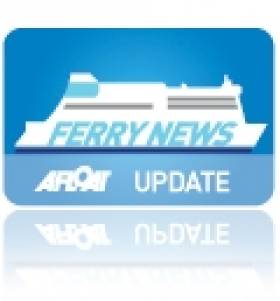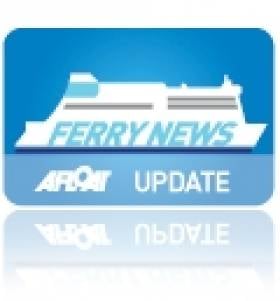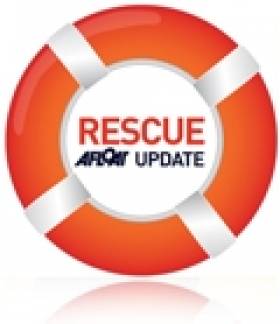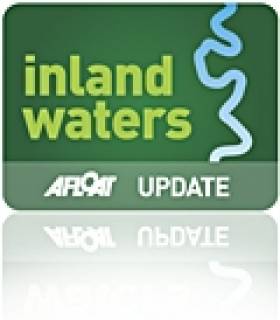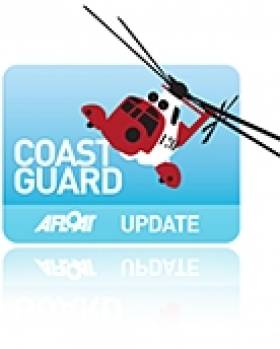Displaying items by tag: cargo ship
Cargo Ship that Ran Aground on Manx Coast Is Successfully Refloated
On the Manx coast a cargo ship which had ran aground along the island's northern coast has been successfully refloated.
The Ceg Orbit, according to Manx Radio, was on a passage in the Irish Sea from Liverpool to Belfast with 1,200 tons of wheat, when it went ran aground at Cranstal during the early hours of Thursday morning.
In what was the second attempt to free the vessel, the Laxey Towing Company tug Wendy Ann assisted by the Liverpool tug CT Vector successfully freed the coaster during high-tide overnight.
The coaster was towed into Douglas Harbour's South Quay this morning where diving teams will survey for any damage caused by the grounding.
Abandoned Cargo Ship ‘Alta’ Runs Aground On Cork Coast
Ballycotton Sea Adventures is reporting that a cargo ship abandoned at sea for more than a year has run aground on the Cork coastline during Storm Dennis, writes Tom MacSweeney.
An initial Irish Coast Guard inspection of the 'ghost ship' from the air reports no signs of pollution so far from the 80-metre vessel, which lies three miles west of Ballycotton.
The Irish Coast Guard's Twitter account posted video recorded from its Rescue 117 helicopter based in Waterford which was tasked to the location.
Rescue 117 was tasked earlier today to a vessel aground near Ballycotton, Cork. There was nobody on board. Previously the @USCG had rescued the 10 crew members from the vessel back in September 2018. The vessel has been drifting since and today came ashore on the Cork coastline. pic.twitter.com/NbvlZ89KSY
— Irish Coast Guard (@IrishCoastGuard) February 16, 2020
Alta was some 1,500km off West Africa in the autumn of 2018 when its crew abandoned ship, and it remained lost at sea until September last year when it was spotted by the Royal Navy in the middle of the Atlantic.
RTÉ News has more on this breaking story HERE.
During #StormDenis this 80 metre vessel 'The Alta' washed up 3 miles west of #Ballycotton. It was cargo vessel that was abandoned in South East Bermuda in October 2018.
— Ballycotton Sea Adv (@BCSeaAdventures) February 16, 2020
The vessel last spotted off the coast of West Africa in September 2019 and has been wandering seas until today pic.twitter.com/6jUsdpbzy9
Cargo Ship Stuck On Rocks In Scotland's West Highlands
#Shipping - A cargo ship en route from Belfast to Norway has run aground near Ardnamurchan Point in Scotland's West Highlands.
And as BBC News reports, the UK coastguard believes it will be stuck there for some time.
The Lysblink Seaways, a 120m-long vessel, found its hull lifted onto the rocky shore after getting into difficulty off Kilchoan in the early hours of yesterday morning (18 Feburary).
There are no reports of injuries among the nine crew on board, and tugs are on the way to try to dislodge the hull from its perch.
BBC News has images of the stricken ship HERE.
Search Ends For Missing Crew Of Capzised Cargo Ship Off Scotland
#Cemfjord - As the investigation into the grounding of a car transporter in the Solent gets under way, at the other end of the UK stormy weather has been blamed for the capsize of a cargo ship in Pentland Firth.
As The Irish Times reports, no trace of the eight crew of the Cemfjord has been found after the 83m cement carrier was spotted upturned in the waters off the far north of mainland Scotland on Saturday 3 January.
A spokesperson for the ship's owners Brise of Hamburg said the ship had sent no distress call before sailing into severe weather.
"It was a violent storm and it seems likely that the weather would have been a factor but, until we have some better idea of what happened, I can't say how much of a factor."
The same vessel was involved in a grounding incident last summer, in which its previous captain was found to be intoxicated while in charge.
Collision Captain's Case Sent to Crown Court
#FERRY NEWS - BBC News reports that the captain of the cargo ship that collided with a passenger ferry in Belfast Lough could face up to two years in prison as his case has been sent to Crown Court.
Miroslaw Pozniak, 55, pleaded guilty on Friday to the charge of 'excess alcohol by the master of a ship' after the cargo vessel Union Moon collided with the Stena Feronia close to the Fairway buoy on Wednesday.
Both vessels were substantially damaged in the incident but there are no reports of injuries.
Newtownards Court heard yesterday that Pozniak has been fired by his employer. He will remain in custody until 20 March when the judge will again consider bail.
#FERRY NEWS - The captain of the cargo ship Union Moon, who was arrested after his vessel collided with a passenger ferry in Belfast Lough, has been charged with 'excess alcohol by the master of a ship'.
BBC News reports that the 55-year-old was set to appear in court today, following his arrest yesterday.
No one was injured in the incident on Wednesday, when the Union Moon collided with the Stena Feronia close to the Fairway buoy between Carrickfergus and Helen's Bay. Both vessels were substantially damaged.
The cargo ship, which was carrying 2,000 tonnes of aggregate, was brought back to Belfast. Philip McNamara of the Donaghdee lifeboat confirmed that a large section of her bow was missing.
Meanwhile, engineers from Stena Irish Sea are assessing the damage to their vessel to determine how long it will be out of service. The Stena Feronia sails the route from Belfast to Birkenhead in Merseyside.
The Maritime and Coastguard Agency, the Marine Accident Investigation Branch and the PSNI are all involved in the investigation.
BBC News has more on the story HERE.
- Ferry news
- collision
- Belfast Lough
- cargo ship
- Union Moon
- captain
- charged
- drink
- excess alcohol
- ferry
- Stena Feronia
- Birkenhead
- Merseyside
- court
- Fairway buoy
- Carrickfergus
- Helen's Bay
- Philip McNamara
- Donaghdee
- Lifeboat
- Stena Irish Sea
- Maritime and Coastguard Agency
- Marine Accident Investigation Branch
- psni
Search Scaled Down for Missing Crewman in Irish Sea
#RESCUE - BBC News reports that the search for a cargo ship crewman missing in the Irish Sea has been scaled down.
The 22-year-old from Slovakia was reported missing yesterday morning from the Fehn Sirius, which was en route from Belfast to Portugal, as it headed past Arklow, Co Wicklow.
According to The Irish Times, he was last seen on the cargo ship around 10pm on Monday night as it headed south of the entrance to Strangford Lough.
Lifeboats from Portaferry and Newcastle in Northern Ireland and Arklow joined the search and rescue operation, which was assisted by the RAF helicopter based at Prestwick in Scotland and an Irish Coast Guard helicopter.
However, most rescue services have now been stood down as the Fehn Sirius continues to backtrack in the Irish Sea, with assistance from the Naval Service vessel LE Ciara.
Only three days ago the body of another mariner was recovered from the Irish Sea off the north Dublin coast, more than a month after he went missing.
Fond Memories of Guinness Barges on the Liffey
#INLAND WATERWAYS - As Derek Evans writes in The Irish Times, the recent discovery of the first Guinness merchant vessel - sunk a century ago by a German torpedo in the Irish Sea - rekindled memories of the brewery's boats on the Liffey in the 1950s.
He writes: "Living close to Stoneybatter, I often took time to stand on Queen Street Bridge as the barges, filled with Guinness barrels, slowly made their way from James’s Gate to Sir John Rogerson’s Quay.
"I remember clearly the skipper standing beside the open wheelhouse in his navy blue polo-neck jumper, captain’s hat and pipe... The skipper always had a smile and a wave before he would disappear for a few moments under the white cloud."
He also recalls the hoisting of the barrells at Butt Bridge onto the Guinness cargo vessels - like the WM Barkley, the Lady Grania or Gwendolen Guinness - for transport to Liverpool.
As previously reported on Afloat.ie, the wreck of the WM Barkley was captured in high-resolution images taken from the national research vessel RV Celtic Voyager off the coast of Dublin.
The Irish Times has more on the story HERE.
Russian Ambassador Proposes Reward for Swanland Rescuers
#COASTGUARD - Russia's ambassador to Britain has proposed rewarding rescuers involved in the search for missing seamen in the Irish Sea last week following the sinking of the cargo ship Swanland.
As previously reported on Afloat.ie, the cargo vessel - carrying 3,000 tonnes of limestone - went down some 10 miles west of the Lleyn peninsula in north Wales in the early hours of last Sunday.
Two of the eight crew, who were all Russian, were recovered from the sea. A third was found deceased, while the remaining five are still missing.
As many as 11 coastguard rescue teams were involved in the search operation, which also saw an RAF rescue helicopter - piloted by Prince William - lend assistance.
At a meeting with the two rescued sailors in London last Wednesday, Ambassador Alexander Yakovenko commented: “What if we propose [the rescuers] to be rewarded by the Russian side?”
Russian news agency RIA Novosti has more on the story HERE.
Probe into Death of Seaman at Waterford Port
An investigation has been launched into the death of a seaman in Waterford Port yesterday.
The Irish Independent reports that the 51-year-old sailor from the Philippines fell more than five metres after being struck by machinery.
He had been tying down a load on the cargo ship MV Scot Pioneer when the incident occurred around lunchtime yesterday. He later died from his injuries.
The Health and Safety Authority and gardaí went to the scene, and RTÉ News reports that a post-mortem was set to take place yesterday afternoon.
The Port of Waterford Company also issued a statement extending its sympathies to the man's family and colleagues.



























